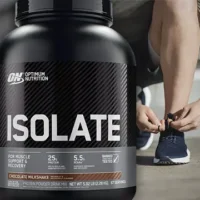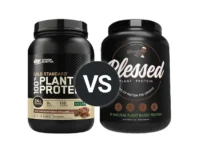Knowledge BaseYou're Questions Answered
Can I drink protein powder during a workout?
Consuming protein powder during a workout can have mixed effects, depending on the duration and intensity of the exercise. It's important to understand both the potential drawbacks and benefits to make an informed decision.
When Protein During a Workout May Not Be Ideal
For most typical workouts, consuming protein during exercise is not recommended. Protein can cause digestive discomforts, such as bloating and cramps, because during intense physical activities, blood flow is prioritized to the muscles rather than the digestive system. Furthermore, protein is not an efficient source of energy for short to moderate exercise sessions, where carbohydrates serve as a better fuel source1,2.
Benefits for Prolonged Workouts
In contrast, during prolonged endurance activities lasting several hours, such as marathon training or long cycling events, consuming protein can be beneficial. Protein during these activities can help prevent muscle breakdown and supply a steady flow of amino acids, supporting sustained performance and recovery. For these types of workouts, including protein in combination with carbohydrates can help maintain energy levels and enhance overall endurance2,3.
Considerations for Intra-Workout Protein Consumption
- Type of Protein: Easily digestible proteins such as whey or hydrolyzed protein are preferable during workouts because they are absorbed quickly and less likely to cause stomach discomfort. These forms can provide the necessary amino acids without the heaviness or digestive issues associated with more complex proteins1.
- Workout Intensity and Duration: For most regular training sessions, intra-workout protein may not be necessary. However, for workouts lasting longer than an hour, such as marathon training or extensive weightlifting sessions, consuming protein can be beneficial for maintaining muscle performance and recovery4.
- Hydration and Electrolytes: It’s important to balance protein intake with adequate hydration, especially if protein is consumed as a part of a sports drink. Ensure that your intra-workout drink also includes electrolytes if you’re sweating significantly.
In summary, while not essential for everyone, consuming protein powder during a workout can offer benefits under certain circumstances, particularly for those engaged in prolonged or intense physical activity. It’s always best to listen to your body and consider your specific needs and reactions to protein during exercise.
- Tipton, K. D., & Wolfe, R. R. (2001). Exercise, protein metabolism, and muscle growth. International Journal of Sport Nutrition and Exercise Metabolism, 11(1), 109-132.
- Phillips, S. M. (2014). Dietary protein requirements and adaptive advantages in athletes. Nutrition in Clinical Practice, 27(4), 551-555.
- Pasiakos, S. M. et al. (2013). Effects of high-protein diets on fat-free mass and muscle protein synthesis following weight loss: a randomized controlled trial. The FASEB Journal, 27(9).
- Moore, D. R., Robinson, M. J., Fry, J. L., Tang, J. E., Glover, E. I., Wilkinson, S. B., ... & Phillips, S. M. (2009). Ingested protein dose response of muscle and albumin protein synthesis after resistance exercise in young men. The American Journal of Clinical Nutrition, 89(1), 161-168.
Related Questions

Your Answer
We are a participant in the Amazon Services LLC Associates Program, an affiliate advertising program designed to provide a means for us to earn fees by linking to Amazon.com and affiliated sites.





